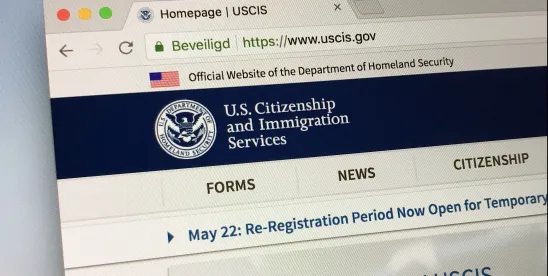The U.S. Citizenship and Immigration Services (USCIS) February 2025 policy memorandum and July 2025 policy manual update highlight the agency’s intensified immigration enforcement efforts.
Generally, USCIS will no longer exempt classes or categories of foreign nationals from potential enforcement except in the exercise of prosecutorial discretion. One update describes the circumstances under which USCIS issues Notices to Appear (NTAs). An NTA is a charging document that instructs foreign nationals to appear before an immigration judge and that commences removal (deportation) proceedings and referrals to Immigration and Customs Enforcement (ICE).
The update states that USCIS will now also issue NTAs in the following circumstances:
- When required by statute or regulation, such as following termination of conditional permanent resident or refugee status.
- In cases involving foreign nationals who have been arrested, charged with or convicted of a criminal offense once a benefit request has been denied or withdrawn, so long as they are not subject to mandatory detention.
- In cases involving substantiated fraud or material misrepresentation upon adverse action of the benefit request or other unfavorable determination or action.
- When a foreign national has no other lawful immigration status or authorization to remain in the United States upon denial or withdrawal of temporary protected status (TPS) after following procedures in the applicable regulations, where required, unless there is sufficient reason to delay issuance of or not issue the NTA.
- When a foreign national has no other lawful immigration status or authorization to remain in the United States, upon issuance of an unfavorable decision of a benefit request.
- In other special circumstances, such as following expiration or termination of parole if the foreign national is not lawfully present in the United States.
- Upon issuance of an unfavorable decision when the beneficiary of an employment-based petition is not lawfully present or is otherwise removable and was the signatory on the I-129 petition.
The updated policy has led to an increased issuance of NTAs, including to H-1B workers within the 60-day grace period following termination of employment, undermining the regulations at 8 CFR 214.1(l)(2).
USCIS also clarified that beneficiaries of family-based petitions may be issued an NTA if they are otherwise removable, since a family-based immigrant petition accords no immigration status or relief from removal, notwithstanding that, in some cases, such beneficiaries may be eligible to adjust status. For example, a foreign national who has filed for adjustment of status (applied for a green card) based on marriage to a U.S. citizen and has overstayed their status or worked without authorization is deportable and inadmissible (not eligible to seek entry or stay in the United States) for such immigration violations. However, such violations are waived when an applicant seeks to adjust status to permanent resident based on the immediate relative relationship (such as marriage to a U.S. citizen). A similar waiver exists for adjustment of status applicants who are beneficiaries of employment-based petitions and have overstayed status, worked without authorization, or violated the terms and conditions of admission, so long as the aggregate period of violations is 180 days or fewer, among other requirements. As such, the updated USCIS policy undermines such waivers of inadmissibility.





 />i
/>i
